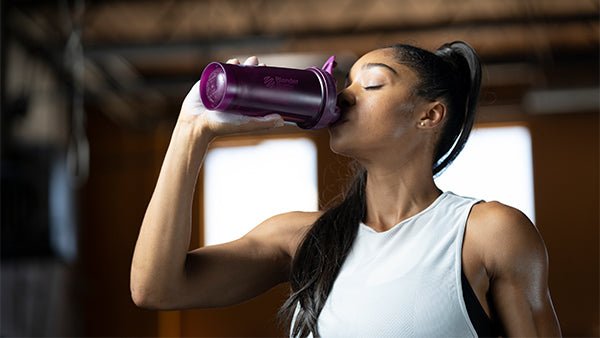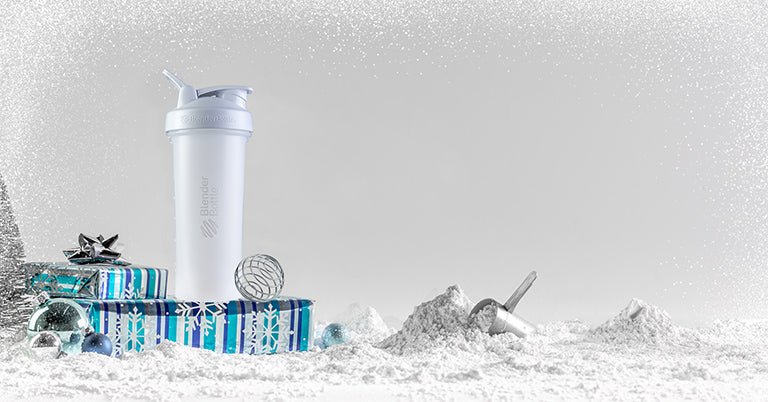We've all heard the recommendation to drink eight eight-ounce glasses (64 ounces in total) of water daily. But is this correct, or just a commonly followed myth? How much water should you drink a day?
Let's look at why staying hydrated is so important in the first place. Then, we'll investigate current fluid intake recommendations and the variables that can help determine the right amount for you. So grab a glass or better yet, grab ahold of the all-new 74-oz. BlenderBottle Koda jug fill up with crisp, cool water, and read on to learn how much water a day you need.
Why Water Matters
Literally every system in our bodies utilizes water, which accounts for roughly 60 percent of total body weight. Therefore it's easy to understand why the question of how much water to drink a day is important.
Water works to flush toxins from our bodies and transport nutrients to our cells. A lack of water, or dehydration, can have dangerous consequences. A review of Water, Hydration and Health by the National Institutes of Health points to several potential health concerns related to dehydration. These include impaired cognitive, gastrointestinal, kidney, and heart function. Dehydration is commonly associated with headaches, and hydration levels may impact numerous chronic diseases.
In regards to athletics, even mild dehydration can negatively impact physical performance, with athletes participating in high-intensity or endurance activities (think tennis or triathlon) being especially susceptible. Dehydration during exercise can manifest as increased fatigue, increased perceived exertion, decreased endurance, and lagging motivation.
Fluid intake is obviously important. But how much water should you drink a day?
How Much Water A Day?
The standard "8 x 8" recommendation is right up there with digging into a daily apple to keep the doctor away. Sure, it sounds like a great common-sense concept. But is 64 ounces of water an accurate and appropriate target? The answer isn't exactly a simple yes or no nor is it the same for everyone.
The most recent and widely accepted water consumption guidelines come from the National Academy of Science (NAS). In the NAS report on dietary intake, the official recommendation for how much water to drink a day is to consume enough to satisfy your thirst. Normally, says the NAS, most adults living in a temperate climate will naturally take in enough fluids through drinking to thirst (in addition to the water content consumed from their food) to maintain proper hydration.
NAS does, however, offer Adequate Intake (AI) dietary guidelines, and that's where we find the most recent fluid intake goals. According to the NAS, a general guideline for adults ages 19 and older is for men to consume 125 ounces of total fluids per day (3.7 liters), while women should aim for 91 ounces (2.7 liters). It's important to note that these numbers account for total fluid intake, including that from all beverages and food. Approximately 20 percent of our fluid consumption comes from our food, so the adjusted beverage guidelines are 101 ounces (3 liters) for men and 74 ounces (2.2 liters) for women.
Notably, both these AI guideline numbers are above the long-held 64-ounce threshold. But before you latch onto your new fluid goal, keep in mind that numerous variables influence how much water to drink a day, and it's possible you'll want to drink even more. These variables include:
-
If you live in a hot climate, you'll require more fluids. Likewise, how many ounces of water a day you need will increase at high altitude, and in indoor environments with dry heated air.
-
Certain common health conditions such as fever, vomiting, and diarrhea contribute to fluid loss, and thus require additional intake.
-
Pregnant and breast-feeding women need extra fluids to stay hydrated. The NAS bumps the AI guideline for total beverage consumption up to 78 ounces for pregnant women and 105 ounces when breast-feeding.
-
If you exercise hard enough to sweat, you need to add extra fluids to your regimen (the amount depends on how long and hard you exercise and how much you sweat).
How Much Water Is Too Much?
For athletes, water alone may not be the best option for staying hydrated. Drinking too much plain water can pose a potential risk, particularly to endurance athletes, because the electrolytes lost through sweat need to be replaced. A condition called hyponatremia, which can range from mild to life threatening, can result when blood sodium levels fall dangerously low. Therefore it's critical for endurance athletes to rehydrate with electrolyte replacement sports drinks, rather than water alone.
How Much Water Should I Drink A Day?
Now that you have a better understanding of why water and other fluids are important, you can target how much water a day is right for you. Take stock of your personal situation and adjust your drinking habits as needed. When in doubt as to what's best for your body, your environment, your individual health, and your lifestyle, consult a registered dietician or your physician.






Leave a comment
All comments are moderated before being published.
This site is protected by reCAPTCHA and the Google Privacy Policy and Terms of Service apply.